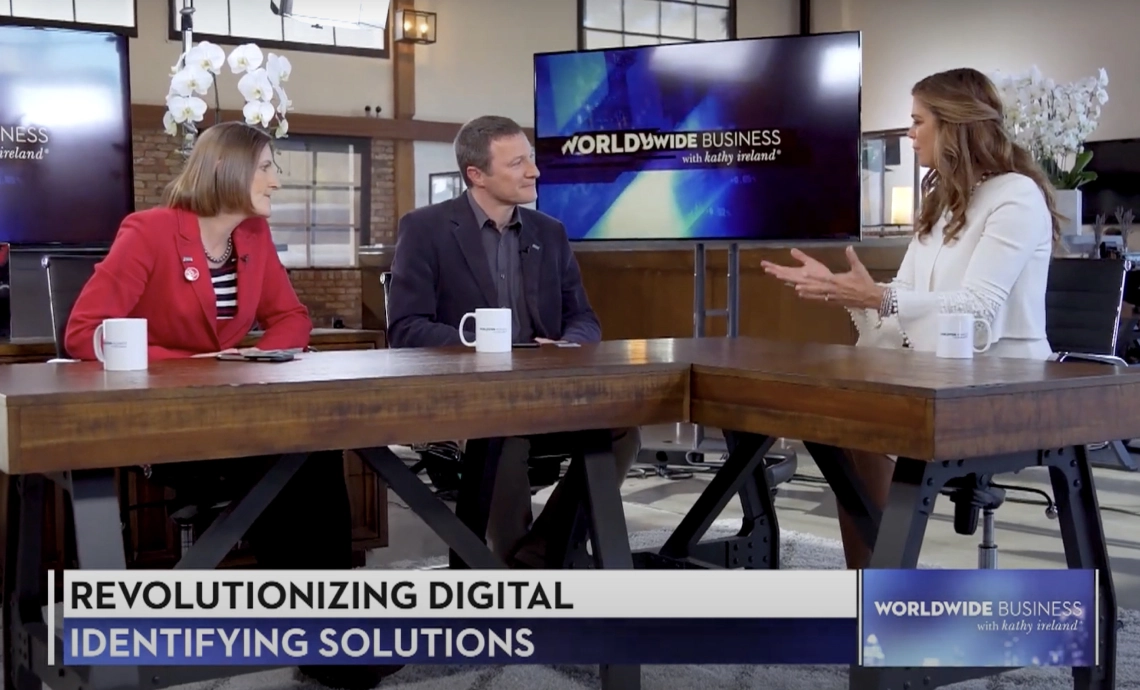
Our CEO Robin and Director of Regulatory and Policy Julie had the pleasure of speaking to entrepreneur and CEO Kathy Ireland on her Worldwide Business show. They discussed the challenges we aim to solve, how Yoti can help protect children online and why digital identities will be integral to a safer future for businesses and individuals.
You can read the interview below or watch the full interview here.
Kathy: Julie how is Yoti solving these problems [of data breaches, fraud and identity theft]?
Julie: Day in, day out we are asked to prove our age or identity – this could be to buy a bottle of wine at the supermarket, to rent a flat or to apply for a job. At the same time ID documents are easily lost or stolen. In the UK alone over a million ID documents are lost every single year; imagine the scale of that globally.
We need a secure way to prove our identity, both online and in person. So we’ve designed a free app where you just use your face and your ID document to set up a digital identity. You only need to do this once, but you can then use it many times to securely prove who you are.
You can also share just parts from it, so just the fact that you’re over 21 or over 18. So that’s a very disruptive way of proving who you are, and you are in control of your digital identity.
Kathy: Robin, how can individuals use Yoti?
Robin: I could use it to buy alcohol online, or to prove my age at the supermarket. The retailer could show you a Yoti QR code, which you would scan. You check what details the retailer is asking you for, such as your photo and 18+, and if you’re happy to share those details with the retailer you hit ‘Allow’. That’s all there is to it.
Kathy: And how would a business use Yoti?
Robin: If I was a bouncer at a nightclub, I could check the age of individuals by asking them to scan a Yoti QR code and share their verified details.
If I was a classified site, I could use Yoti to let individuals sign up and share their verified details at the touch of a button. That means all of the buyers and sellers know people on the site have been verified to a high standard, which creates more trust and transparency online.
Kathy: Robin one of your first big milestones was to be selected by the government of Jersey. Tell us more about this.
Robin: Like any government they need to be sure about who they are dealing with online. So whether you are filling in a tax return or you’re changing your address at the health service, it’s all now very easy to do with a digital identity. It’s simpler and it’s more secure.
Kathy: Julie I saw you had great success with an unusual video with over 32 million views. What was that all about?
Julie: It was a video about online dating. Many people meet their partners through online dating but we wanted to give a twist to it and highlight some of the potential dangers of meeting strangers online, but do this in a light-hearted way. You can watch the video here.
Kathy: This is funny and humorous but there’s a seriousness behind it. Can Yoti help protect children from online predators?
Julie: One of the things we can help people do is to have verified areas, so to know that people are all under 18 in a chat room or all over 18 on a website. People can just share the fact that they are under or over a certain age – a data minimisation approach that helps protect their identity whilst giving the website the information they need.
Robin: So it could be a help site for young girls, and they could use Yoti to anonymously share their verified ‘under 18’ attribute to get access to that chat room. But a 49-year-old would not be able to get in.
Kathy: Why else do you think people will get a digital identity?
Robin: Whether it’s the 500 million people who were hotel guests of Marriott or the 140 million people with Equifax, that’s a huge amount of personal and valuable data that has been exposed. It’s passport details and social security numbers. Those people can never get that information back from fraudsters and it puts them at great risk of identity theft.
After a data hack, the only way for people to take back control of their valuable information is to create a digital identity, linked to their phone and secured with their unique biometrics. This is a nightmare for fraudsters. That’s why it’s inevitable that people will get a digital identity to help keep themselves safe.

